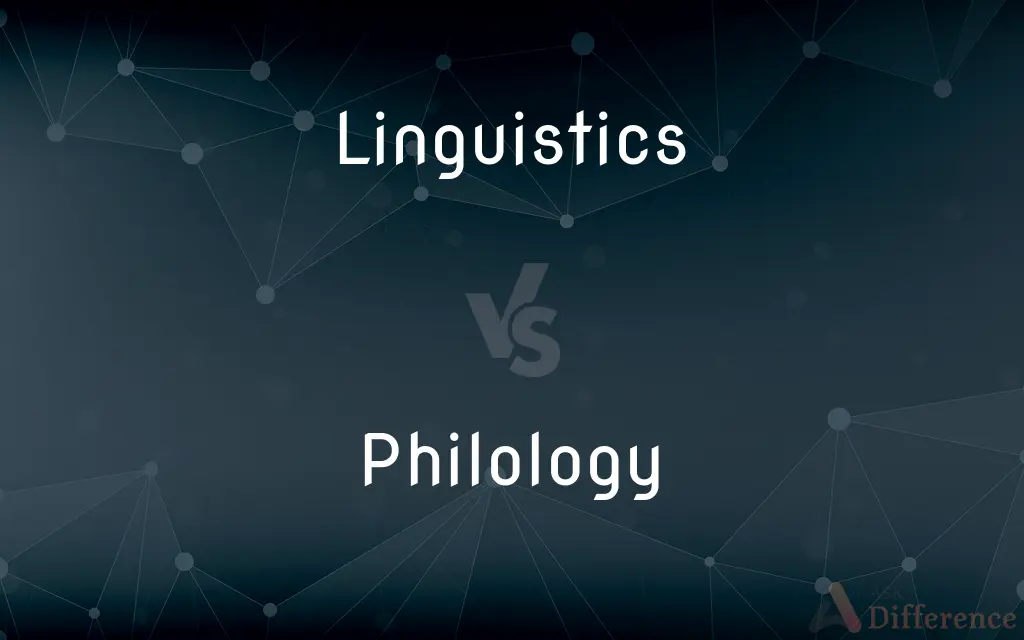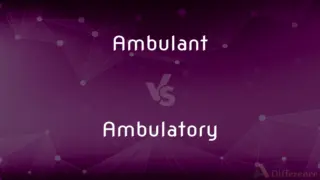Linguistics vs. Philology — What's the Difference?
By Tayyaba Rehman — Updated on October 17, 2023
Linguistics is the scientific study of language and its structures, while philology focuses on the study of language in historical and literary texts.

Difference Between Linguistics and Philology
Table of Contents
ADVERTISEMENT
Key Differences
Linguistics and philology, though related, are distinct disciplines within the broader study of language. Linguistics is primarily concerned with understanding language as a universal and distinctive human phenomenon. It examines the mechanics, evolution, and nuances of language, covering areas like syntax, morphology, phonetics, semantics, and pragmatics. Linguistics seeks to decode the patterns and rules governing language use, as well as the cognitive processes involved.
On the other hand, philology has a historical lens. Philology delves into written texts to trace the historical development of languages and to understand cultural contexts. It combines linguistic analysis with historical and literary study, aiming to interpret ancient texts and understand language shifts over time. Philology is more than just historical linguistics; it intertwines linguistic understanding with literary and cultural knowledge.
Moreover, the methods used in linguistics and philology often differ. Linguists might employ tools like acoustic analyzers, corpora databases, and cognitive experiments. Philologists, however, frequently engage with ancient manuscripts, inscriptions, and literary texts, using methods to decipher, translate, and interpret them in their historical context.
In simpler terms, while linguistics is a wide-reaching study of language in all its facets, philology is centered on the intricate relationship between language, literature, and history.
Comparison Chart
Primary Focus
Structure and function of language.
Language in historical and literary contexts.
ADVERTISEMENT
Scope
Broader, studies language universally.
Specific, delves into textual and historical analysis.
Methodology
Empirical, experimental, observational.
Textual analysis, interpretation, translation.
Interdisciplinary Nature
Overlaps with psychology, anthropology, etc.
Combines linguistics with literature and history.
Key Concerns
Syntax, semantics, pragmatics, morphology, etc.
Evolution of language, textual criticism, historical context.
Compare with Definitions
Linguistics
Linguistics is the scientific study of language and its structure.
Through linguistics, we can understand the fundamental building blocks of human communication.
Philology
Philology involves the reconstruction of dead or ancient languages not currently spoken or understood.
Through philology, experts can revive ancient languages for modern exploration and understanding.
Linguistics
Linguistics encompasses the analysis of language form, language meaning, and language in context.
Linguistics allows researchers to delve into semantics, syntax, and pragmatics of different languages.
Philology
Philology refers to the historical study of texts and their meaning, including the study of authors and their times.
Philology provides a deeper understanding of classical literature within its original historical context.
Linguistics
Linguistics involves the exploration of historical, comparative, and theoretical aspects of language.
In linguistics, historical language development can provide insight into cultural shifts over time.
Philology
Philology is a discipline that focuses on the interpretation, establishment, and criticism of texts.
Through philology, scholars critically analyze ancient manuscripts to establish their authenticity.
Linguistics
Linguistics is the study of the sounds, words, and grammar used in languages.
Linguistics can help in understanding the intricate rules that govern language use.
Philology
Philology is the study of the development of languages and their relationship to other languages.
Philology involves comparative studies to trace how languages may have diverged from common ancestors.
Linguistics
Linguistics is the discipline that investigates the cognitive and social aspects of human languages.
Linguistics explores how language influences the way people perceive the world.
Philology
Philology is the study of language in written historical sources; it is a combination of literary criticism, history, and linguistics.
Philology reveals the evolution of language and literature through ancient texts.
Linguistics
Linguistics is the scientific study of language. It encompasses the analysis of every aspect of language, as well as the methods for studying and modeling them.
Philology
Philology is the study of language in oral and written historical sources; it is the intersection of textual criticism, literary criticism, history, and linguistics (with especially strong ties to etymology). Philology is more commonly defined as the study of literary texts as well as oral and written records, the establishment of their authenticity and their original form, and the determination of their meaning.
Linguistics
The study of the nature, structure, and variation of language, including phonetics, phonology, morphology, syntax, semantics, sociolinguistics, and pragmatics.
Philology
Literary study or classical scholarship.
Linguistics
The scientific study of language.
Philology
See historical linguistics.
Linguistics
The science of languages, or of the origin, signification, and application of words; glossology.
Philology
The humanistic study of language.
Linguistics
The scientific study of language
Philology
(uncommon) linguistics.
Linguistics
The humanistic study of language and literature
Philology
(philosophy) Love and study of learning and literature, broadly speaking.
Philology
(culture) Scholarship and culture, particularly classical, literary and linguistic.
Philology
Criticism; grammatical learning.
Philology
The study of language, especially in a philosophical manner and as a science; the investigation of the laws of human speech, the relation of different tongues to one another, and historical development of languages; linguistic science.
Philology
A treatise on the science of language.
Philology
The humanistic study of language and literature
Common Curiosities
Is philology still relevant today?
Yes, philology provides crucial insights into ancient cultures, languages, and literary texts, contributing to various academic fields.
Can linguistics be applied to artificial languages?
Yes, linguistics can analyze and categorize the structure and usage of artificial or constructed languages.
How does linguistics intersect with psychology?
Linguistics intersects with psychology in studying how language acquisition affects and is affected by cognitive processes.
What is the main focus of linguistics?
Linguistics primarily focuses on the structure, usage, and cognitive aspects of language.
How does philology differ from linguistics?
Philology combines historical literary analysis, language study, and cultural context, while linguistics is the scientific study of language itself.
How does computational linguistics benefit from AI?
AI enhances computational linguistics by enabling more sophisticated language processing and natural language understanding technologies.
What are the major branches of linguistics?
Major branches include phonetics, phonology, morphology, syntax, semantics, and pragmatics.
How do philology and archaeology complement each other?
Philology interprets texts and language, while archaeology provides physical context, together reconstructing historical narratives.
What skills does a philologist need?
Critical thinking, textual analysis, a grasp of historical contexts, and understanding of linguistic principles are key skills.
Why is philology important in historical studies?
Philology helps decipher, interpret, and authenticate ancient texts, providing context to historical events.
Can philology be used in studying modern languages?
While traditionally focused on ancient texts, philology's methods can be applied to modern language studies, especially historical linguistics.
Can linguistics contribute to language preservation?
Absolutely, linguistics plays a critical role in documenting, studying, and preserving endangered languages.
Are linguistics and language studies the same?
Linguistics is scientific and theoretical, while language studies may focus more on practical aspects of learning and using languages.
How is philology relevant to literature studies?
Philology's text analysis methods provide deeper insights into literary works, their origins, and authorial intent.
How does sociolinguistics differ from general linguistics?
Sociolinguistics studies the relationship between language and society, while general linguistics focuses on language's structure and function.
Share Your Discovery

Previous Comparison
Rehabilitation vs. Restoration
Next Comparison
Ambulant vs. AmbulatoryAuthor Spotlight
Written by
Tayyaba RehmanTayyaba Rehman is a distinguished writer, currently serving as a primary contributor to askdifference.com. As a researcher in semantics and etymology, Tayyaba's passion for the complexity of languages and their distinctions has found a perfect home on the platform. Tayyaba delves into the intricacies of language, distinguishing between commonly confused words and phrases, thereby providing clarity for readers worldwide.













































